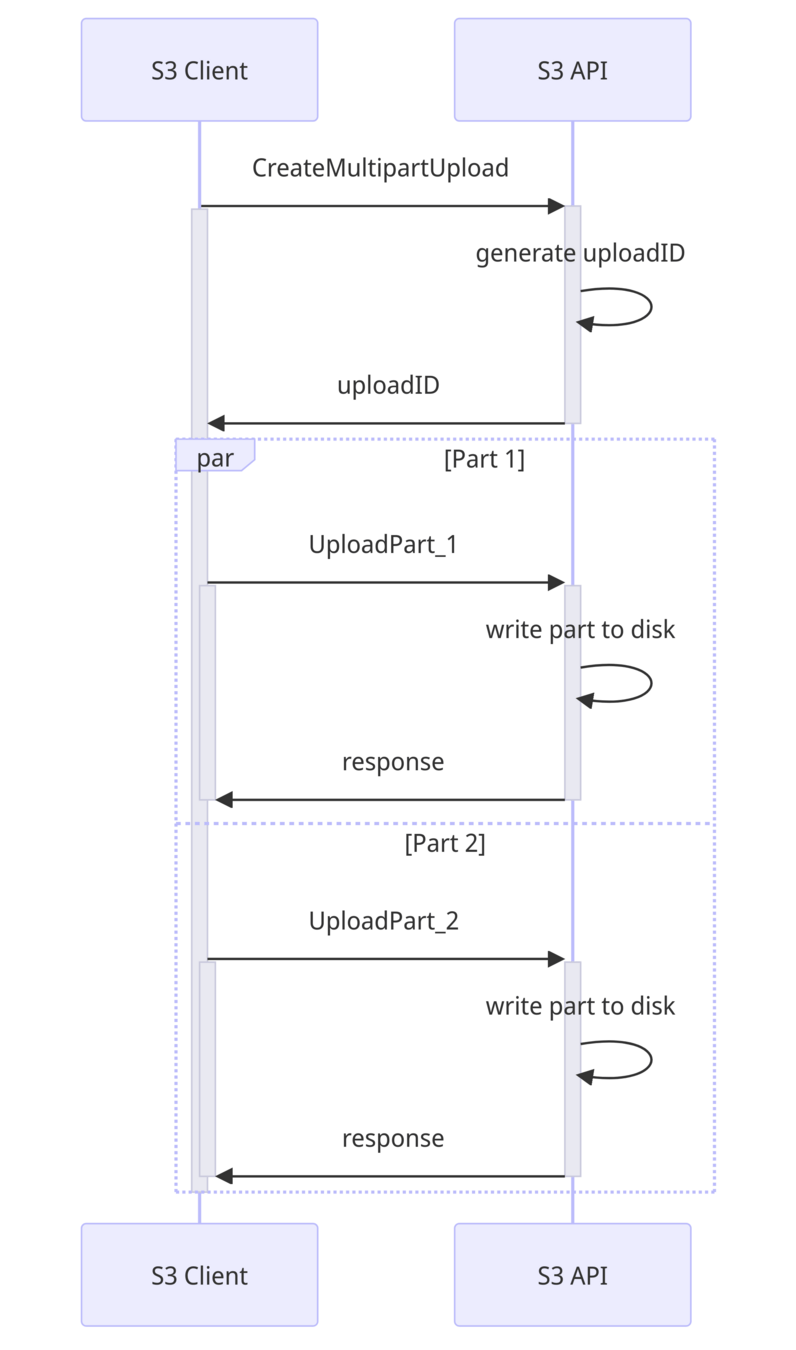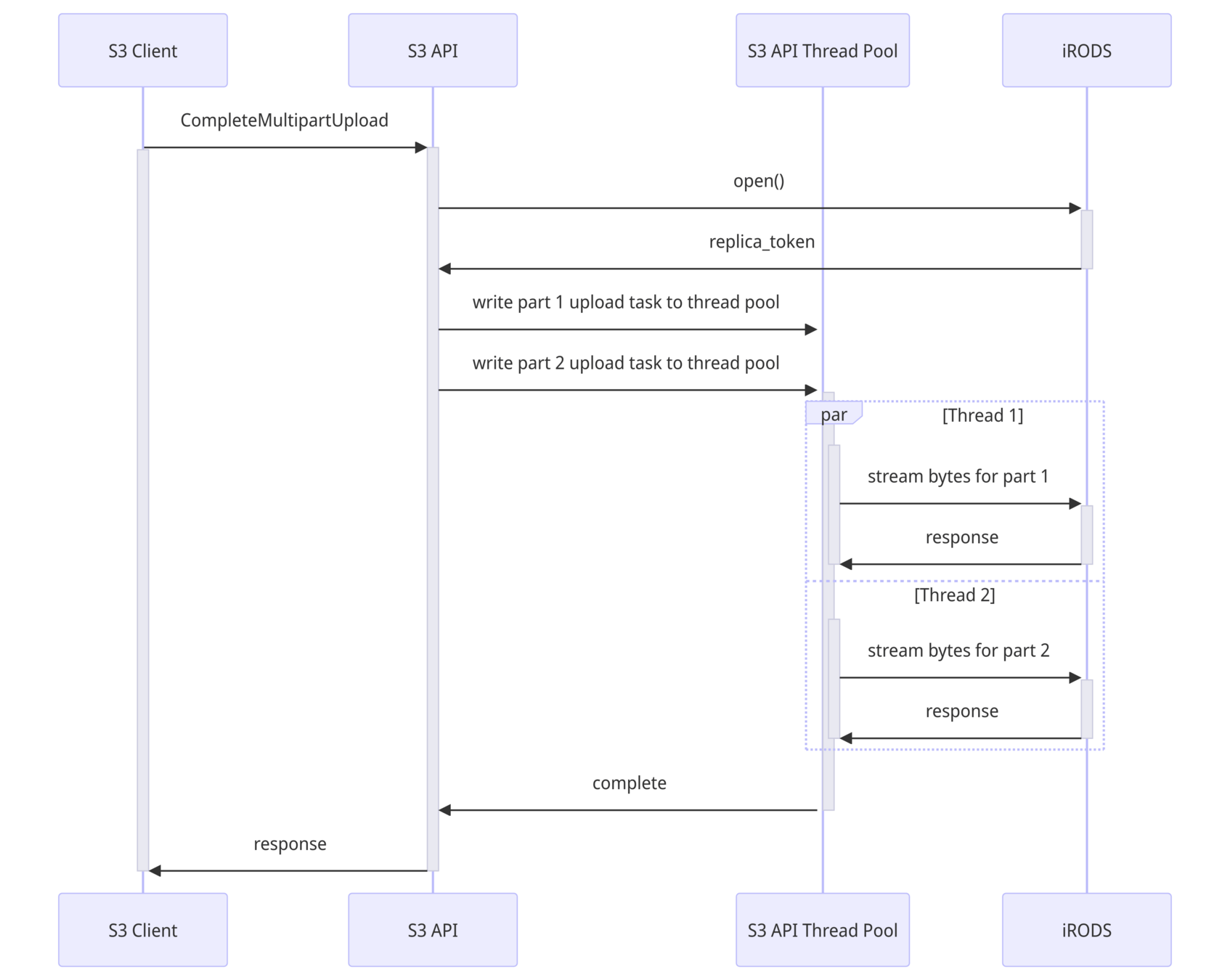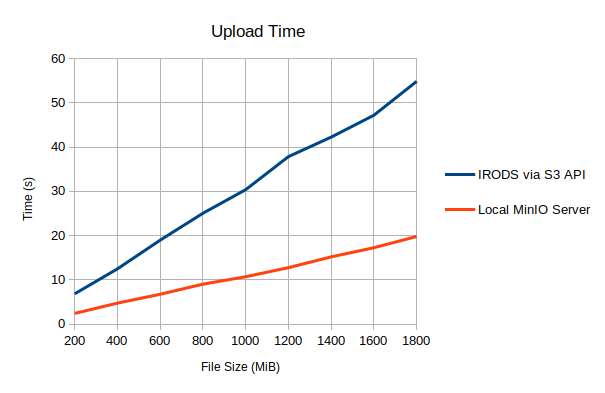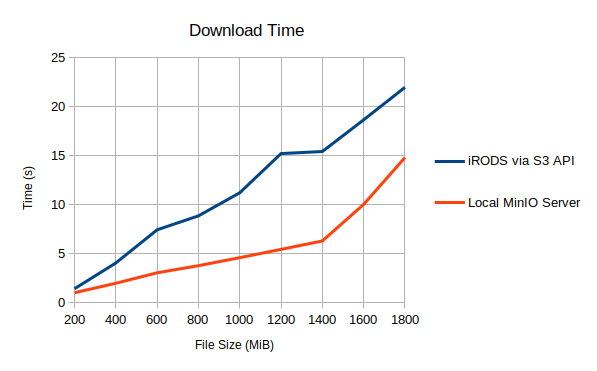Justin James
Applications Engineer
iRODS Consortium

iRODS S3 API v0.2.0
with Multipart
May 28-31, 2024
iRODS User Group Meeting 2024
Amsterdam, Netherlands

iRODS S3 API - Goals
- Present iRODS as the S3 protocol
- Multi-user
- Multi-bucket
- Load Balancer friendly
- Maintainable

iRODS S3 API - History
- iRODS S3 Working Group
- https://github.com/irods-contrib/irods_working_group_s3
- Initial email 2021073
- 2023 - Violet White implemented many of the endpoints
- v0.1.0 released Nov. 2023
- v0.2.0 released March 2024

Architecture and Status

- Single binary
- Single configuration file
- Multi-user
- Multi-bucket
- Requires rodsadmin credentials
- Tests passing with:
- AWS CLI Client
- Boto3 Python Library
- MinIO Python Client
- MinIO CLI Client

iRODS S3 API - Changes Since UGM 2023
- Added a docker-based testing framework
- HMAC/Signatures now working for all clients
- Implemented multipart uploads
- Code migrated to framework used by HTTP API
- coroutines removed / foreground and background task queues
- boost::beast::http calls changed from sync to async
- CMake files updated for consistency with other projects
- Added support for range headers for GetObject
- Refactor / reverse engineered ListObjectsV2 to work exactly as Amazon S3
- Updated code to handle HTTP chunked encoding
- Implemented new endpoints
- HeadBucket
- GetBucketLocation
- GetObjectLockConfiguration
- ListBuckets
- GetObjectTagging

iRODS S3 API - Status
- Implemented Endpoints
- CompleteMultipartUpload
- CopyObject
- CreateMultipartUpload
- DeleteObject
- DeleteObjects
- GetBucketLocation
- GetObject
- GetObjectLockConfiguration (stub)
- GetObjectTagging (stub)
- HeadBucket
- HeadObject
- ListBuckets
- ListObjectsV2
- PutObject
- UploadPart
- Investigating
- ListObjects
- GetObjectAcl
- PutObjectAcl
- PutObjectTagging
- UploadPartCopy
- AbortMultipartUpload

iRODS S3 API - Configuration
Single file which defines two sections to help administrators understand the options and how they relate to each other.
Modeled after NFSRODS.
{
// Defines S3 options that affect how the
// client-facing component of the server behaves.
"s3_server": {
// ...
},
// Defines iRODS connection information.
"irods_client": {
// ...
}
}
iRODS S3 API - Configuration - s3_server
"s3_server": {
"host": "0.0.0.0",
"port": 9000,
"log_level": "info",
"plugins": {
"static_bucket_resolver": {
"name": "static_bucket_resolver",
"mappings": {
"<bucket_name>": "/path/to/collection",
"<another_bucket>": "/path/to/another/collection"
}
},
"static_authentication_resolver": {
"name": "static_authentication_resolver",
"users": {
"<s3_username>": {
"username": "<string>",
"secret_key": "<string>"
}
}
}
},
"region": "us-east-1",
"multipart_upload_part_files_directory": "/tmp",
"authentication": {
"eviction_check_interval_in_seconds": 60,
"basic": { "timeout_in_seconds": 3600 }
},
"requests": {
"threads": 3,
"max_size_of_request_body_in_bytes": 8388608,
"timeout_in_seconds": 30
},
"background_io": { "threads": 6 }
}

iRODS S3 API - Configuration - irods_client
"irods_client": {
"host": "<string>",
"port": 1247,
"zone": "<string>",
"tls": { /* ... options ... */ },
"enable_4_2_compatibility": false,
"proxy_admin_account": {
"username": "<string>",
"password": "<string>"
},
"connection_pool": {
"size": 6,
"refresh_timeout_in_seconds": 600,
"max_retrievals_before_refresh": 16,
"refresh_when_resource_changes_detected": true
},
"resource": "<string>",
"max_number_of_bytes_per_read_operation": 8192,
"buffer_size_in_bytes_for_write_operations": 8192
}
iRODS S3 API - Multipart Options Considered
A. Multiobject - Parts written as separate objects. On CompleteMultipartUpload, parts are concatenated on the iRODS server.
- Efficient
- Unintentional execution of policy for each part
- Pollutes iRODS namespace
- Would require a concatenate API plugin
B. Store-and-Forward - Write each part to the mid-tier, then forward to iRODS on CompleteMultipartUpload.
- No extra policy triggered
- Requires a large amount of scratch space in the mid-tier
- Non-trivial CompleteMultipartUpload
C. Efficient Store-and-Forward - Write down / hold non-contiguous parts in the mid-tier, then send contiguous parts to iRODS when ready.
- Complicated - parts are not necessarily sent in order and can be resent
- Do not know part offsets so could only forward when all previous parts have been written
- Worst case almost the entire object would still need to be stored in the mid-tier
D. Store-and-Register - Write to a file accessible to iRODS and register when complete.
- Still requires writing individual part files since we do not know the part offsets
- Requires shared visibility between iRODS and S3 API

iRODS S3 API - Multipart Store-and-Forward

For now we have chosen the store-and-forward approach.
1. CreateMultipartUpload
- Generate a UUID for the upload_id
- Return the upload_id in the response.
2. UploadPart
- Write bytes to a local file
<multipart_upload_part_files_directory>/irods_s3_api_<upload_id>.<part_number>

iRODS S3 API - Multipart Store-and-Forward

3. CompleteMultipartUpload
- Create the object in iRODS
- Determine the offset for each part
- Iterate through the parts and create tasks on the thread pool to upload parts to iRODS.
- When all parts are done, remove part files and send response to the client
- In a pure S3 environment, CompleteMultipartUpload does not move data and usually completes quickly. That is not the case here.
4. AbortMultipartUpload (not yet implemented)
- Remove part files from mid-tier
iRODS S3 API - Performance Comparison
The following compares transfers to/from iRODS via the S3 API with transfers to/from a local MinIO server. The Boto S3 client was used for all cases.

Notes:
- The tests consisted of transfers of files from 200 MB to 1800 MB.
- The median of five runs is reported for each file size.
- Multipart uploads require two read/write cycles with store-and-forward.
- The S3 API was configured with 30 threads handling requests and 30 background threads.
- Performance degraded with large files when there was an insufficient number of background threads.



iRODS S3 API - Multipart - Enhancement - Efficient Store and Forward
In the future we may migrate to the efficient store-and-forward approach.
The design is not finalized but the following is a possible approach.
- As UploadPart requests are received, store the Content-Length in a table along with an upload status which is one of the following:
- WRITING_TO_DISK
- STREAMING_TO_IRODS
- DONE_WRITING_TO_DISK
- FINISHED
- When receiving the UploadPart request for part N, if the Content-Length of parts [1, N-1] are known, open a stream to iRODS, perform the appropriate seek(), and stream directly to iRODS. Set the status to STREAMING_TO_IRODS. When finished streaming set the status to FINISHED.
Note that if the client uses chunked parsing, the Content-Length is not known until all chunks are parsed.
- If previous part sizes are not known, part N must be written to disk in the mid-tier. Set the status to WRITING_TO_DISK. Once the part has been completely written to disk, set the status to DONE_WRITING_TO_DISK.
- Have a background task examine all parts that are DONE_WRITING_TO_DISK. If all previous parts are of known size, set the status to STREAMING_TO_IRODS and begin streaming that part to iRODS. Once finished, set the status to FINISHED.
- CompleteMultipartUpload simply needs to wait until all parts are marked FINISHED.
Open question:
- What if a part is resent with a different size?

iRODS S3 API - Multipart - Enhancement - Store and Register
Another approach for an enhancement would be store-and-register where the initial part files are written to the iRODS server, combined into one file, then registered.
- An API would need to be created to write part files to the iRODS server. At this point these would simply be POSIX files, not data objects.
- During CompleteMultipartUpload, another API would be used to call copy_file_range() to concatenate all part files into one and register this new file in iRODS.
This approach has some challenges:
- This would not execute policy until registration. This is both good and bad. How do we enforce that the file is written to the correct server?
- What if the S3 API is configured to write to an object store?
- While it would be significantly faster than the current approach, CompleteMultipartUpload would still have to wait until the part files could be combined into one file.
One approach is to offer the option of efficient store-and-forward and store-and-register with caveats on how store-and-register can be used.

iRODS S3 API - Next Steps
- More testing / expand testing framework
- Implement multipart efficient store-and-forward
- Additional endpoints
- Tagging
- ACLs
- Additional plugins
- Other bucket mappings
- Other user mappings

iRODS S3 API
Release v0.2.0
- https://github.com/irods/irods_client_s3_api
- March 6, 2024
- Available via Docker Hub
Thank you!
Questions?
